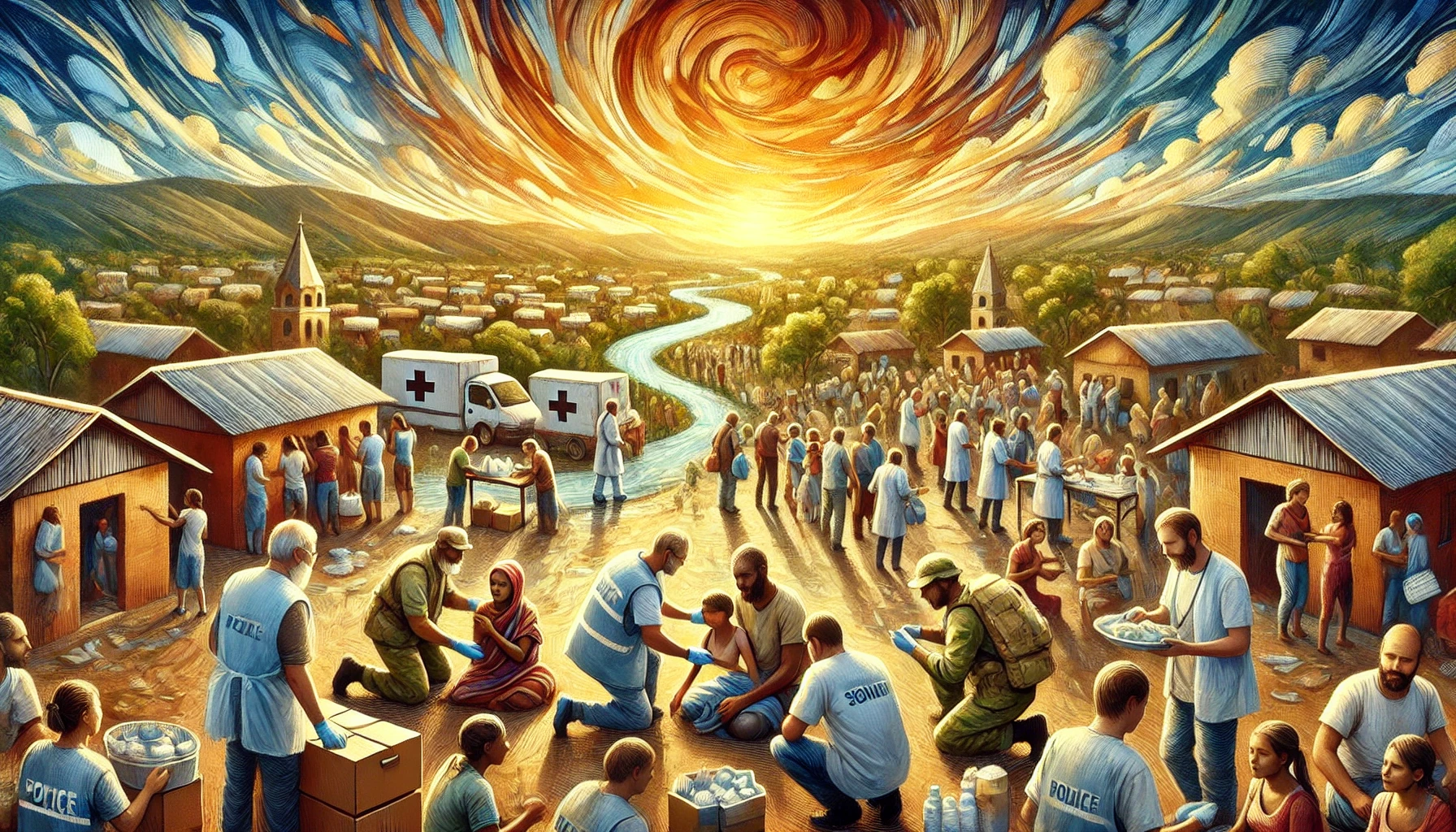
- This event has passed.
World Humanitarian Day
August 19

World Humanitarian Day, celebrated on August 19th each year, is a global observance dedicated to recognizing humanitarian personnel and those who have lost their lives working for humanitarian causes. The day serves as a reminder of the ongoing need to provide support and protection to vulnerable populations and those affected by crises worldwide. It underscores the commitment of individuals and organizations who tirelessly work to alleviate human suffering amidst conflict, natural disasters, and other global challenges.
The inception of World Humanitarian Day was marked by the tragic bombing of the United Nations headquarters in Baghdad, Iraq, on August 19, 2003. This attack claimed the lives of 22 staff members, including the UN’s High Commissioner for Human Rights, Sergio Vieira de Mello. The day was officially designated by the United Nations General Assembly in 2008, aiming to honor the bravery and sacrifice of humanitarian workers and to increase public awareness about humanitarian assistance activities worldwide.
History and Significance
World Humanitarian Day not only commemorates the lives lost in the service of humanitarian aid but also aims to promote the safety and security of aid workers everywhere. It highlights the challenges and risks that humanitarian personnel face as they carry out their tasks in often dangerous and unstable environments. The day provides an opportunity to advocate for the survival, well-being, and dignity of people affected by crises, as well as for the safety and security of aid workers themselves.
This day is pivotal in raising awareness and understanding of humanitarian assistance activities and the challenges that accompany them. It is a call to action for governments, organizations, and individuals to support and protect workers and volunteers involved in alleviating human suffering. The observance of World Humanitarian Day has grown to include events and activities around the world, such as discussions, exhibitions, campaigns, and memorials for fallen workers.
Traditions and Rituals
Traditionally, World Humanitarian Day is marked by a variety of events aimed at honoring humanitarian workers and raising awareness about humanitarian issues. These events include global campaigns, local community events, and digital activations that engage a broad audience to support and understand humanitarian efforts. Various non-governmental organizations (NGOs), international agencies, and community groups come together to highlight the themes of the day, often focused on the protection of aid workers and the support for human rights.
Memorials and ceremonies are commonly held to remember those who have died while serving humanitarian causes. These solemn occasions often include the reading of names and the lighting of candles. Additionally, educational events such as workshops, seminars, and panel discussions are organized to delve deeper into the complexities of humanitarian work and discuss ways to protect those who carry it out.
Modern Celebration
In the modern context, World Humanitarian Day has embraced technology and social media as pivotal tools in amplifying its message and engaging a global audience. Online campaigns using hashtags such as #NotATarget and #RealLifeHeroes have gained traction, allowing people from different parts of the world to share their stories, celebrate successes, and advocate for the rights and protection of humanitarian workers. These campaigns highlight the personal stories of aid workers and the communities they help, bringing a personal touch to the challenges and achievements of humanitarian efforts.
Educational outreach has also expanded with virtual conferences and webinars becoming more prevalent, especially in the wake of global challenges like the COVID-19 pandemic. These digital events provide platforms for experts, humanitarian workers, and the general public to engage in meaningful dialogue about the principles of humanitarian aid and the urgent needs of affected populations. The celebration of World Humanitarian Day is a moment to reiterate global solidarity and the commitment to human dignity and peace.
10 Congratulations and Wishes
- “May your compassion and dedication continue to shine as a beacon of hope to those in need. Happy World Humanitarian Day!”
- “On World Humanitarian Day, we honor your unwavering spirit and thank you for being an inspiration to humanity.”
- “Thank you for your courageous heart and relentless service. Wishing you strength on World Humanitarian Day and always.”
- “To all the humanitarian heroes out there, may your day be filled with the same hope and kindness you provide to others daily.”
- “Happy World Humanitarian Day! Your actions are a testament to the strength and resilience of the human spirit.”
- “Celebrating the heroes who bring light to the darkest places, Happy World Humanitarian Day to you all!”
- “Your selflessness builds a better world for all of us. Thank you and have a powerful World Humanitarian Day!”
- “May this World Humanitarian Day remind you how vital your work is and how deeply it is appreciated by all who witness it.”
- “Here’s to the hands that heal and the hearts that care. Wishing you a peaceful and rewarding World Humanitarian Day.”
- “Thank you for standing in the front lines of crisis and caring. May your path be blessed and your efforts rewarded.”
10 Unusual Facts
- The concept of World Humanitarian Day was inspired by the most significant single attack on humanitarian workers: the bombing of the UN headquarters in Baghdad in 2003.
- More than 130 countries observe World Humanitarian Day each year, with events ranging from memorials to campaign launches.
- The day was officially sanctioned by the United Nations General Assembly following a campaign led by France and other countries.
- Humanitarian workers are often targeted in conflicts, with hundreds of aid workers attacked each year.
- The #NotATarget campaign was launched to advocate for the protection of civilians and aid workers in conflict zones.
- World Humanitarian Day sometimes coincides with national days of remembrance and mourning in various countries, adding a dual significance to the observance.
- The day is also used to launch global humanitarian action plans and funding appeals.
- It is estimated that over half a million aid workers are actively involved in humanitarian missions worldwide.
- The first World Humanitarian Day was commemorated in 2009, and each year has a different theme focusing on various humanitarian issues.
- Innovations in technology are increasingly playing a role in humanitarian aid, with virtual reality experiences being used to raise awareness and empathy.
10 Frequently Asked Questions with Answers
- What is World Humanitarian Day?
World Humanitarian Day is an international day dedicated to recognizing humanitarian personnel and those who have lost their lives working for humanitarian causes. - Why do we celebrate World Humanitarian Day?
The day honors the work and sacrifices of humanitarian workers worldwide, promoting the safety and security of these individuals while highlighting the need for humanitarian assistance. - How was World Humanitarian Day established?
The day was established by the United Nations General Assembly in 2008, following a tragic attack on the UN headquarters in Baghdad that killed 22 humanitarian workers. - What are common activities on World Humanitarian Day?
Activities include global campaigns, local events, educational programs, and digital engagements to raise awareness about humanitarian efforts and worker safety. - How can individuals contribute on World Humanitarian Day?
Individuals can participate in or organize awareness campaigns, donate to humanitarian causes, and educate themselves and others about the challenges facing humanitarian workers. - Are there any specific themes for World Humanitarian Day?
Yes, each year has a specific theme aimed at addressing different challenges or aspects of humanitarian work. - What impact has the #NotATarget campaign had?
The campaign has helped to raise global awareness about the need to protect civilians and humanitarian workers in conflict zones, influencing policy changes and public perception. - How significant is social media in celebrating World Humanitarian Day?
Social media plays a crucial role in amplifying the day’s message, engaging global audiences, and sharing stories of humanitarian efforts and worker experiences. - What risks do humanitarian workers face?
Humanitarian workers often face risks such as violence, kidnapping, disease, and being caught in crossfire while carrying out their duties in unstable or conflict-affected regions. - How does World Humanitarian Day impact global humanitarian policies?
The observance of this day provides an opportunity to press governments and organizations to uphold and enforce policies that protect humanitarian workers and support humanitarian efforts globally.
World Humanitarian Day is not only a day to remember those who have suffered or lost their lives in humanitarian service but also a vital occasion to reaffirm our global commitment to peace, security, and human dignity. It calls on each of us to advocate for those who are most vulnerable and to support the men and women who face danger and adversity to assist others. This day reminds us that humanity must be the cornerstone of our actions and decisions, especially in times of disaster and conflict.
The importance of World Humanitarian Day extends beyond annual commemorations; it is a day that challenges us to reflect on our values and to actively contribute to making the world a safer, more caring place. It emphasizes the need for international cooperation and solidarity, urging individuals and nations alike to support those in dire need of help — not just in times of emergency but every day.
Author’s Opinion
As we observe World Humanitarian Day, it is crucial to recognize the ongoing struggles that humanitarian workers endure and the continuous need for global awareness and direct action. These individuals represent the best of humanity, often risking their lives to uphold human rights and to provide relief to those in crisis. Their dedication and sacrifice embody the true spirit of humanity and remind us of our shared responsibility to foster a more compassionate and just world.




